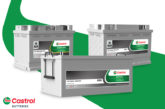Andy Savva looks at both the good and bad points associated with creating a franchised model.
Having previously owned and managed a number of successful independent garages (including my last one, Brunswick Garage), I regularly pondered whether franchising the business would be a sensible route to take. In theory it sounds so good: expand the empire, grow the brand and, of course, hopefully get a better financial return. In practice, however, the reality is a little different…
Firstly, I believe that the independent repair sector is one of the most difficult industries to franchise. About three years ago a business in the Midlands (who will remain nameless) opened in a blaze of glory; an independent garage that was to be franchised with the aim of having a duplicate version opened in most major UK cities.
Andy Savva is a former multiple independent garage owner who boasts over 30 years’ experience in the automotive repair sector. In every issue of PMM he’ll be sharing his advice with workshop owners who want to improve their business’ bottom line, but simply don’t know how to go about it.
The originator of this idea didn’t have a background in the motor trade and, when a second site was opened, I was asked my opinion about whether the whole idea could be successful. My answer then, as it is now, is that it would be practically impossible for it to succeed. I’ve been proven right, as this particular business has now closed down. The reasons behind my thoughts are very clear: an independent workshop isn’t like most other franchises where you’re generally purchasing a product, such as coffee or shoes. Selling a service is perhaps the most difficult sale to make. When a vehicle owner is buying a service/repair, that person is really purchasing a promise, a promise that will be fulfilled in the future. That requires trust, skill, competence, ability, technical knowledge, and much more.
There are too many processes, procedures, and interactions between customers and staff members that simply can’t be duplicated across multiple sites. We’re in the business of dealing with emotions and behaviours that can’t easily be accounted for; what works in one area of the country may not necessarily work in another. There are so many variables and barriers to consider, such as customer and vehicle demographics, while land and property costs differ up and down the country.
However, no matter what your goals are as a business owner, it’s important to review the ‘pros’ and ‘cons’ of growing your business in order to hone your vision and assess potential stumbling blocks before they arise.
Whichever way you decide to take your own business there are pitfalls and benefits in all camps – single site, multi-site and franchise. Ultimately it will come down to the desires and ambitions that you set yourself!
I’ve tried to highlight some of key points to considor if you want to expand in gto a multi-site independent garage.
PROS
- ✓ Economies of scales – when purchasing parts or equipment you should be in a position to achieve better prices.
- ✓ Marketing activities can be combined – a wider message at a lower cost and increasing brand awareness.
- ✓ Cross utilisation of employees between locations, depending on need.
- ✓ One manager could be spread over two or three sites.
- ✓ Possibility of sharing diagnostic equipment – depending on what services you offer at different locations.
- ✓ More profit achieved with multiple sites.
- ✓ A successful multi-site can attract a larger corporate if an exit strategy is the end objective.
- ✓ If family are involved then it could be easier to expand – families tend to form a grounded and loyal foundation.
CONS
- ✗ Increased capital investment – opening a garage isn’t a cheap exercise.
- ✗ Location is critical – is it easy for customers to get to?
- ✗ What works in one area may not work in another – it’s important to research and understand the customer type and vehicle demographics in that specific location.
- ✗ Difficult to manage if you don’t have rigid processes and procedures in place that are clear to all workshop and reception staff members.
- ✗ Difficult to manage staffing levels and correct management structure with the right pay incentives.
- ✗ Poor customer service from one site can affect the perception of another site.
- ✗ Managing costs across several locations is not easy – strict controls need implementing as costs can spiral out of control if other sites aren’t successful.
- ✗ With attention divided amongst other locations this could have an impact on customer service and create distance between stakeholders and staff.










